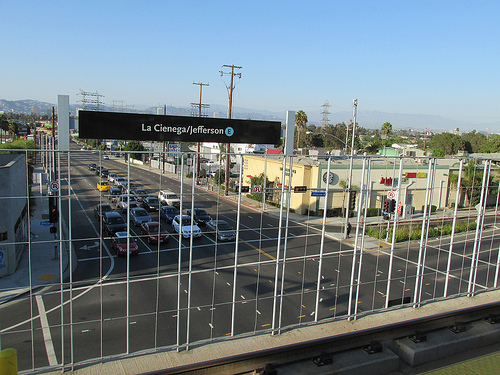West Adams Housing Prices Rise But Business Remains Slow

Yet there is little that Perez knows about housing issues in the area surrounding La Cienega and Jefferson Boulevards, an intersection from which she says her home is only four miles away.
The coalition, which Perez described as a "citywide tenant movement," has worked in nine of L.A.'s 14 public housing developments and includes well-known local organizations such as the Bus Riders Union and the Legal Aid Foundation of Los Angeles.
"I can't tell you from my own experience because I haven't worked as a community organizer in the neighborhood. What does concern me is that there's very little community organizing happening in this area," Perez said. "And I think there's a big need for it."
When asked about development issues in the surrounding area, Perez said she had not heard much. "What I have heard a lot about is the fracking that's going on in [the surrounding] Baldwin Hills, and people being very concerned about the health effects ... people having to move out of the community because of the fracking," she said.
"It'll be interesting, actually, to see how the community starts changing," she added. "And to connect that, because we are very concerned with the development that's going on around transit stops."
The extension of the Metro line has opened up discussion of gentrification within the area. "Transit-oriented flips," as termed by Curbed L.A., have created a hot market in recent years.
In a post titled, "Is this Transit Oriented Flip (TOF) the Start of Something Big?", one house less than two miles from La Cienega and Jefferson was listed for $479,000 in March, previously sold for a significantly lower $320,000 in January.
The Exposition Metro Line Construction Authority issued an invitation last year for bids to contract improvements for the parking lot of the Culver City station (pictured here), later picked up by the All-American Asphalt Company for around $316,000, according to a government report. (See the newly paved parking lot here.)
Perez said it was too early to tell whether the opening of the La Cienega/Jefferson Metro stop would affect property values or the flow of business in the area, a slow-moving neighborhood plagued with graffiti, littered sidewalks and known gang activity. Just earlier this fall, hair salon owner Robert Arong said he found a young man stabbed outside his business, an incident that he said was not uncommon and had been one of the reasons for his decision to relocate after three years.
"I didn't want to come back into the neighborhood, and I still don't want to come back into the neighborhood, because there's too many problems going on with the shootings, and the gangs," said Arong, who became a grandfather last year.
If there are signs of recent development, they are not immediately apparent, both to the casual observer and to those who frequent the area.
Arong, who had been watching television on a Sunday afternoon in his near-empty salon, said business was at a standstill. "This salon right here, we might get a walk-in once a month, once every two months," he said. "Business is slow."
He pointed across the street. "As you can see, one of the businesses has shut down," he said, adding that it was difficult for small businesses to survive in the area. "Now they're opening a cupcake place right there."
Annette Tucker, a legal secretary who lived in the area as a teenager, said the neighborhood has seen an influx of residents over the years. When asked what could be improved, she said, "probably more supermarkets and less liquor stores," pointing to a lack of food options for residents, including restaurants.
A possible reason may be the fact that West Adams is still a largely low-income area, whose residents may not be able to afford eating at restaurants that are expensive in comparison to the visible number of fast-food outlets available.
"Rents are very high," Perez said of her own neighborhood, an area classified as high-income for the city of L.A. "I have to pay more than half my income."
In addition to her position at the Housing Collective, Perez works as a Spanish-language translator on a freelance basis to be able to afford rent, saying that a one-bedroom apartment in Westchester is around $1,100 a month. "I have to work two, you know, like side jobs," she said.
As a community organizer, Perez said she needed to examine which areas particularly needed information and support, "so that folks in this community can start to prevent that same fate [of gentrification] and retain the cultural richness of this community."
Reach Assistant News Editor Michelle Toh here. Follow her on Twitter here.



